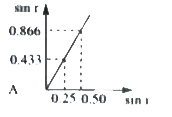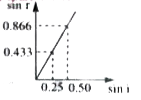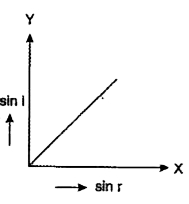Light is incident from a medium A to medium B. The graph of sine of angle of incidence i versus sine of angle of refraction r is shown in fig. Which of the following is/are correct?

Total internal reflection occurs above a certain value of i.
Total internal reflection will not occur for any value of i
Wavelength of light in medium B is √3 times that in medium A.
Wavelength of light in medium B is 1/ 13 times that in medium A.
The correct Answer is:A, C
Topper's Solved these Questions
- GEOMETRICAL OPTICSBOOK - AAKASH SERIESCHAPTER - GEOMETRICAL OPTICSEXERCISE - LECTURE SHEET (EXERCISE-II (LEVEL-II (ADVANCED) LINKED COMPREHENSION TYPE QUESTIONS))
9 Videos
- GEOMETRICAL OPTICSBOOK - AAKASH SERIESCHAPTER - GEOMETRICAL OPTICSEXERCISE - LECTURE SHEET (EXERCISE-II (LEVEL-II (ADVANCED) MATRIX MATCHING TYPE QUESTIONS))
2 Videos
- GEOMETRICAL OPTICSBOOK - AAKASH SERIESCHAPTER - GEOMETRICAL OPTICSEXERCISE - LECTURE SHEET (EXERCISE-II (LEVEL-I (MAIN) STRAIGHT OBJECTIVE TYPE QUESTIONS))
17 Videos
- ELEMENTS OF VECTORSBOOK - AAKASH SERIESCHAPTER - ELEMENTS OF VECTORSEXERCISE - QUESTIONS FOR DESCRIPTIVE ANSWERS
9 Videos
- LAWS OF MOTIONBOOK - AAKASH SERIESCHAPTER - LAWS OF MOTIONEXERCISE - PRACTICE EXERCISE
98 Videos
Similar Questions
Light is incident from a medium A to medium B. The graph of sine of angkle of incidence I versus sine of angle of refraction r is shown in fig. Which of the following is/are correct?

View SolutionWhat name is given to the ratio of sine of angle of incidence to the sine of angle of refraction?
View Solution
Knowledge Check
The ratio of sine of angle of incidence in one medium to sine of angle of refraction in other medium is
Arefractive indexBdielectric constantCcritical angleDdispersive powerThe ratio of sine of angle of incidence to the sine of angle of refraction is a constant for given pair of media. This law is known as
AMalus lawBSnell's lawCStefan's lawDPascal's lawA ray of light passes from vaccum into a medium of refractive index n. If the angle of incidence is twice the angle of refraction, then the angle of incidence is
Acos−1(n/2)Bsin−1(n/2)C2cos−1(n/2)D2sin−1(n/2)
For a given pair of media, the ratio of the sine of the angle of incidence to the sine of the anlge of refraction is __
View SolutionLight enters from vacuum to a medium of refractive index μ. If angle of incidence is double of angle of refraction, find angle of refraction.
View SolutionA ray of light passes from vaccum into a medium of refractive index n. If the angle of incidence is twice the angle of refraction, then the angle of incidence is
View SolutionWhen a ray of light undergoes refraction, a straight line graph is obtained by plotting sine of angle of incidence versus sine of angle of refraction. The slope of this graph represents.

View SolutionA ray of light passes from vaccume into a medium of refractive index n. if the angle of incidence is twice the angle of refraction, then the angle of incidence is
View Solution
